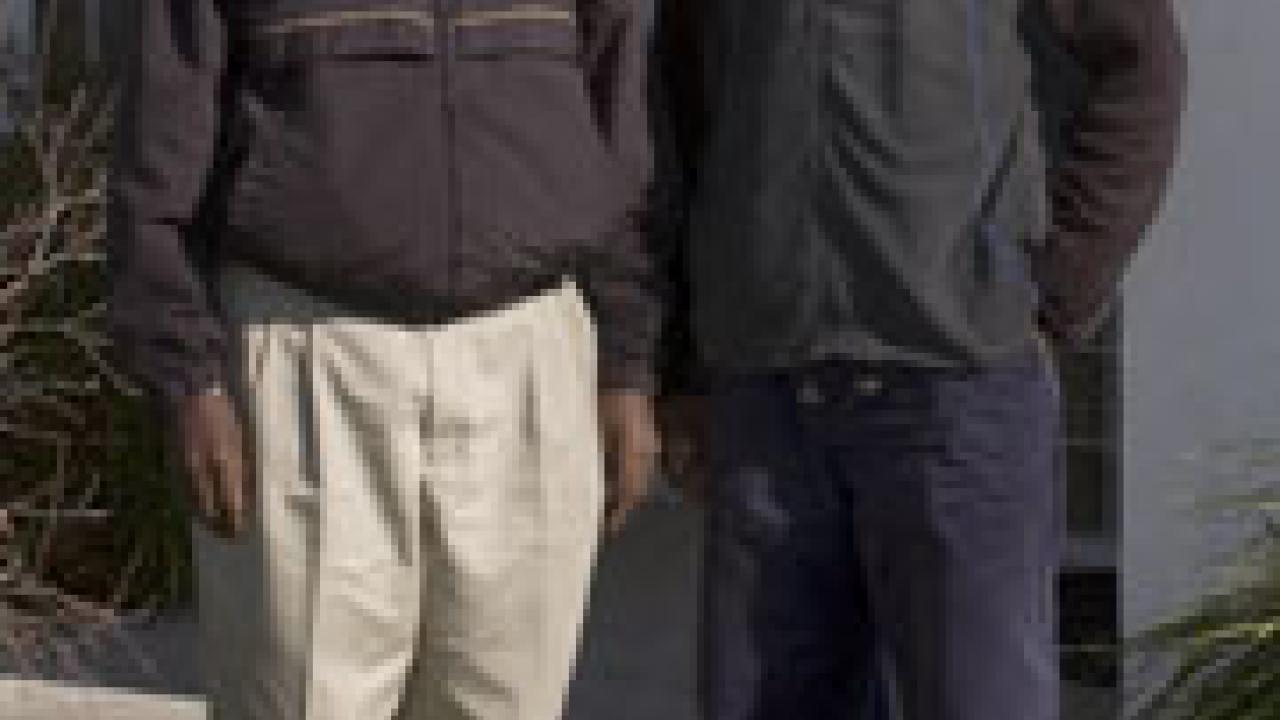In his saggy sweat pants and baseball cap emblazoned with "NYPD," David Kapindula looks like many students on campus.
But in his home country of Zambia, Kapindula is no mere student or particular fan of the New York Police Department. In fact, he is already in the midst of a thriving career, serving as a senior inspector of pesticides and toxic substances for his nation's Environmental Council as well as a project coordinator for the United Nations' Environment Program.
Mid-career growth
Kapindula came to UC Davis last fall to study in the Humphrey Fellowship program, a nationwide effort to bring international mid-career professionals to American universities for a year of study. The goal is to give these highly-motivated and accomplished indviduals the training, experiences and knowledge they might not receive in their own countries — all so they can return and make a difference.
For example, Kapindula will make contacts with U.S. organizations that deal with pesticide regulation and environmental protection. When he returns to Zambia, he may understand better ways to halt chemical smuggling, a problem that has plagued his country in recent years.
The concept is an increasingly popular one in higher education. UC Davis' Humphrey Fellowship program began in 1978, and since then, nearly 3,000 fellows from more than 135 countries have participated. UC Davis hosted the program between 1986 and 1996, and again from 2001 to the present. The nine fellows on campus this year are among 162 nationwide.
But becoming a university student again means fellows must live like students again, no matter how they are used to living back home. They get by on a meager stipend, live in housing suited for twenty-something undergraduates and attend classes with students nearly half their ages.
"As a professional I was used to having a different life style and set-up," said Farhana Shaon, a geophysicist with Bangladesh Oil, Gas and Mineral. "Now here at UC Davis, I have started my student life again. No formal dresses, no formal shoes — just jeans, a pair of sneakers and a backpack."
The transition back to student life can be strange, she admitted.
"Sometimes I feel like an undergrad student who has nothing to care about but study and fun," she said, "but this feeling does not persist for a long time. The thoughts of my family, professional and other responsibilities overrule it."
Kapindula added that he misses the freedom and responsibility of the working life.
"In Zambia, I could walk out of my living room into my car and drive anywhere I want," he said. "I had things to supervise."
"You were a king," joked Remigius Rushomesa, a land use planned for the Ministry of Agriculture and Food Security in the United Republic of Tanzania.
All joking aside, Humphrey Fellowship Program Assistant Coordinator Sasha Ferreira said it's understandable why fellows would feel awkward in their new roles.
"These are all accomplished people where they're from with good salaries," Ferreira said.
"To come here and be expected to live the life of a graduate student, it's a tough adjustment."
'Culture shock'
Fellows also must adjust to the small college town atmosphere of Davis, which may be quite unlike other towns in the world beyond, or this country for that matter.
"There's some cultural shock," said program director Paul Marcotte. "Some fellows come from very sophisticated, cosmopolitan places, but they're adjusting."
After all, they are living in a new place. Kapindula said he needed time to get used to riding a bicycle everywhere.
"The last time I cycled was 20 years ago," he said. "It's fun though."
The year spent away from their families is also draining on the fellows. Most can't afford to relocate their entire households to the U.S. Some, like Kapindula, receive visits from their spouses and children. But other fellows, including Rushomesa, will not see their families for the duration.
"It's a big sacrifice," Rushomesa said. "With advancements in technology we can keep in touch, but I still miss them."
Added Shaon, "It is a great sacrifice from the side of my husband and kids to let me come here. I always wish my family were here with me."
Still, most fellows believe that the time investment will pay off big when they return home. For Rushomesa, he plans to seek out organizations that handle environmental assessments and disaster management in agriculture, and help Tanzanian farmers use resources in a sustainable manner.
The other 2005-2006 Humphrey Fellows include Moez Ben Dhiaf and Faiza Labidi of Tunisia, who work for the Ministry of Agriculture and Environmental Protection Agency, respectively; Magdolna Rozs of the Hungarian Parliamentary Committee of Environmental Affairs; Myanmar's Aung Myo Chit, manager of the National Kandawgyi Gardens Wildlife Department; Liu Guozhi of the Chinese State Environmental Protection Agency; and Thu Nguyen of the Asian Wall Street Journal's Hanoi, Vietnam bureau.
Media Resources
Clifton B. Parker, Dateline, (530) 752-1932, cparker@ucdavis.edu
